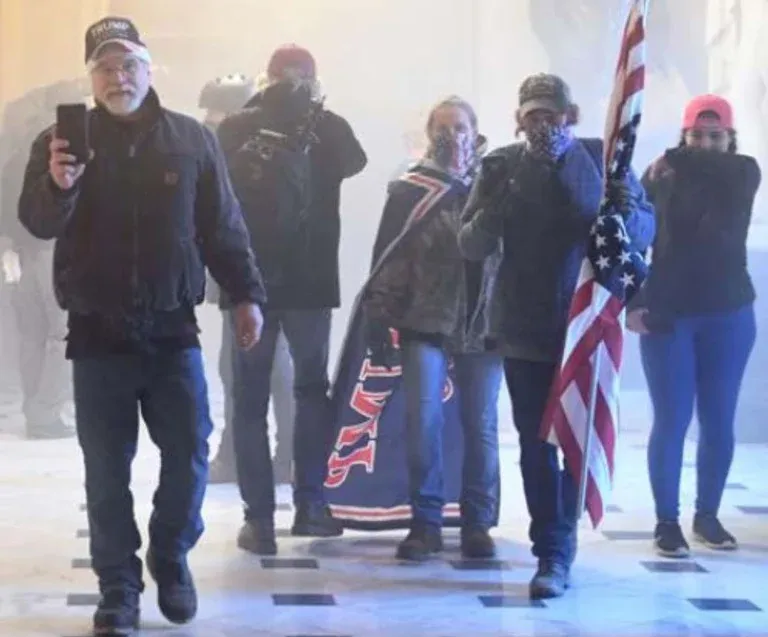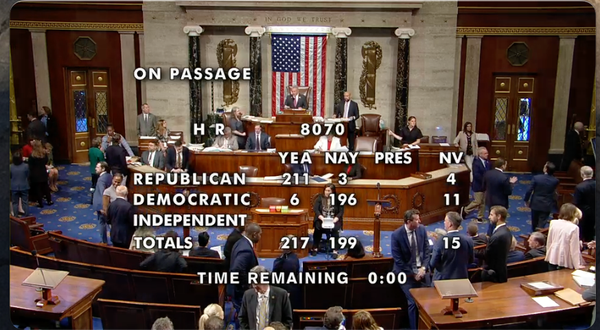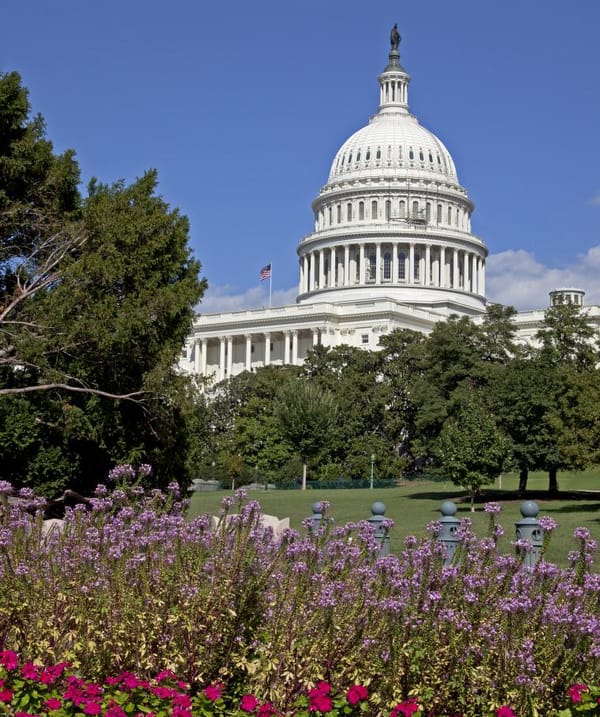Civil War 2.0: Scenario 1--Insurrection Redux?
A critical looming federal court decision could be the excuse Trump uses to ignite another insurrection

As NPR's Ron Elving recently pointed out, it's not impossible that President Biden could overcome historically dismal poll numbers, rally his coalition, and win a second term in office. His more immediate and dangerous problem is whether he'll first be facing a fresh insurrectionist challenge from Trump should certain legal and political developments go against the former president.
In this next-to-last installment of The Republic Sentinel's "Civil War 2.0" series, I look at how two pending federal court cases, a conviction in his January 6, 2021, related cases, or an outright election loss to Biden could each become triggers for Trump to summon his followers to rise up again against the federal government.
Political Triggers for Trumpist Violence
Trigger 1: Adverse decision on Trump's presidential immunity claims
On January 9, Trump's legal team argued before the D.C. Circuit Court of Appeals (DCCCA) that Trump or any president could order the assassination of a political opponent and not be prosecuted unless first impeached and convicted by Congress. Justice Department attorney James Pearce made the obvious point to the three judge panel.
“What kind of world are we living in," Peace asked the court, "… if a president orders his SEAL team to murder a political rival and then resigns or is not impeached — that is not a crime? I think that is an extraordinarily frightening future that should weigh heavily on the court’s decision.”
Trump's January 19 claim that "A president of the United States must have full immunity, without which it would be impossible for him/her to properly function" was likewise generally greeted with derision by a vast range of legal scholars.
This scenario assumes that the DCCCA (which may rule as early as this week in the case) will declare that Trump's post-November 2020 election activities do not constitute "official acts" of the president, and that he is thus not immune from prosecution for attempting to remain in power illegally.
If that happens, will Trump call upon his followers to rise up to try to overthrow the federal government? Based on his behavior to date in the existing civil and criminal cases against him, my assessment is no.
As he has with all of the other legal proceedings against him, Trump will 1) rail on Truth Social and other friendly media about the "corrupt" or "unfair" court decision, 2) fund raise off of it, and 3) direct his legal team to continue to raise every possible objection or employ every conceivable dilatory motion to try to drag out the pre-trial phase of his pending January 6-related criminal trial for as long as possible. He will also appeal the decision to the Supreme Court, which may or may not agree to take the case.
All of this means that the original March 4 trial date for his January 6 case will almost certainly slip by at least a month and possibly much more, meaning that the ultimate trial, his appeal of the verdict to the federal appeals court and to the Supreme Court may drag out into early 2025. And if Trump, despite one or more federal convictions, still wins the election, he could attempt a self-pardon--and it's unclear whether anyone or any entity would necessarily have legal standing to challenge such an act. Alternatively, a hung jury in the January 6-related trial would likely allow Trump to escape prison and, if victorious in the November 2024 election, take office once again. Simply stated, a loss the immunity appeal would not foreclose Trump from still prevailing politically and returning to office.
Trigger 2: Conviction in J6 case which costs Trump the election
Assuming the Supreme Court rules in Trump's favor later this winter or early spring that he cannot, in fact, be disqualified from the 2024 ballot absent action by both chambers of Congress to find him guilty of sedition or insurrection under the 14th Amendment, Trump could still lose the general election to Biden if he's convicted in one or more of the federal criminal trials he faces.
There's credible evidence that among non-hard core MAGA voters or those otherwise not committed to either candidate that a successful federal prosecution and conviction of Trump for fomenting the January 6 insurrection would almost certainly lead to his electoral defeat. Federal courts may not be viewed as legitimate by Trump's hardened supporters, but most Americans still do believe that evidence and the rule of law mean something and thus are paramount to the maintenance of domestic order. If Trump is convicted at the federal level, enough of those voters appear prepared to reject him at the polls.
That outcome could still become a trigger for a level of domestic unrest and increased "lone wolf" or small group terrorism incidents, particularly if Trump once again falsely alleges mass voter fraud in addition to being the victim of a "political" prosecution. Even so, it would likely not lead to the kind of domestic tumult that threatens the survival of the Republic. During the final year of Biden's current term in office, however, there is one scenario that could produce a domestic conflagration of unpredictable scale and duration.
Trigger 3: Adverse decision in Trump v Colorado (14th Amendment, Sec. 3 ballot disqualification)
Within perhaps a matter of weeks, the Supreme Court will rule on whether the Colorado Supreme Court's invocation of Section 3 of the 14th Amendment to disqualify Trump from the federal ballot is constitutional. If America's highest court affirms Colorado's decision, it would likely mean Maine's disqualification of Trump from their state's ballot would also stand, spurring others to bring 14th Amendment ballot disqualification lawsuits in multiple additional states. If enough of those succeed, it could make it mathematically impossible for Trump to win enough electoral college votes to become president.
It is this outcome that represents the greatest danger for political sectarian domestic violence at scale because it represents Trump's "nothing left to lose" scenario. I believe the likelihood he would call for a general uprising against established political institutions and leaders is very high.
The question, then, is this: if he does so, would the tens of millions of his voters join him?
My scenario assumes that they would do so, and on a historic scale.
Fueled by a belief that their chosen candidate had been wrongly barred from office by "corrupt" unelected Supreme Court judges, mass street demonstrations, particularly in DC, would seem inevitable within the first week after such a ruling and invariably create a new, dangerous flashpoint for immediate violence at a scale that could dwarf the events of January 6, 2021.
GOP leaders in the House and Senate would immediately face calls to impeach and remove all Supreme Court justices who voted to uphold the Colorado Supreme Court's exclusion of Trump from the ballot, with ominous threats about what a failure to act might mean for them and their families should they fail to try....this against the backdrop of a trend that has already been high since the January 6, 2021 insurrection.
In the weeks following a Supreme Court ballot disqualification decision, anti-Trump elements across the country will file ballot disqualification suits in their states seeking to replicate the Colorado model. Pro-Trump elements in those same states would seem likely to violently target such activists in an attempt to prevent further ballot disqualification efforts.
GOP controlled legislatures across the country would face immediate pressure from pro-Trump elements to pass legislation mandating that Donald Trump's name be on the federal ballot, notwithstanding the Supreme Court's decision. Alternatively, or perhaps in tandem, calls for secession from the federal government might also ensue.
So if the Supreme Court does uphold the Colorado Supreme Court's ballot disqualification ruling against Trump, does it mean that something approximately Civil War 2.0 could actually happen?
It's fair to ask whether Trump's key demographic (white, over 55, probably most of whom are not in great health) could remotely be ready for sustained conventional combat against organized federal forces that remain loyal to the existing, lawfully constituted government. Guerilla action and/or increased terrorist acts against federal facilities, law enforcement personnel, judges and court personnel, and House and Senate Democratic members, family members, and staff would seem to be the far more likely outcome.
I certainly believe the latter option is a near certainty, but to understand why the scenario I've outlined would likely go far beyond that, we need another short trip down memory lane to understand just how quickly political, and thus military, loyalties can change in a time of maximum domestic political crisis.
From Blue to Gray…
Many Americans probably don't realize who led Union troops against anti-slavery zealot John Brown during his October 1859 raid on the federal armory at Harpers Ferry, Virginia, but to Civil War aficionados the names are legendary: then-Colonel Robert E. Lee and Lieutenant J.E.B. ("Jeb") Stuart. Less than 18 months later, both men would betray the Union and become among the most important and successful officers to serve in the Confederate Army.
Indeed, as a 2001 U.S. Army Center for Military History study of the period notes:
"The roster of the Regular Army was altered considerably by [Jefferson] Davis' action in creating a Confederate Army. Of the active officer corps numbering 1,080, 286 resigned or were dismissed and entered the Confederate service. (At least 26 enlisted men are known to have violated their oaths.) West Point graduates on the active list numbered 824; of these, 184 were among the officers who offered their swords to the Confederacy. Of the approximately 900 graduates then in civil life, 114 returned to the Union Army and 99 others sought southern commissions. General in Chief Scott and Col. George H. Thomas of Virginia were southerners who fought for the Union. More serious than their numbers, however, was the high caliber of the officers who joined the Confederacy; many were regimental commanders and three had commanded at departmental level."
Thus, one in five current or former military officers elected to betray the Republic and join the Confederate Army--a manpower and experience infusion that helped the South start and sustain for four years what remains the bloodiest war in American history.
In 1861, those men believed they were defending a particular way of life, something that transcended any allegiance to an individual politician or group of politicians. The emotions that motivated them were deep and powerful, overriding any capacity for rational thought. Today, most of us understand that their cause was not simply unjust and immoral, it was utterly treasonous.
Should the Supreme Court disqualify Trump from the ballot under the 14th Amendment, his followers will no doubt believe that the existing system is rigged against their leader, and thus against them, and they will no doubt act out of a deep and powerful rage, overriding any capacity for rational thought. Should the Republic survive, future generations will also likely view that their cause was also not simply unjust and immoral, it was just as treasonous as the betrayal of Lee, Stuart, and hundreds of thousands of others.
…to Red versus Blue
In calling for a general uprising, Trump would no doubt appeal for assistance and support to GOP governors who have already endorsed him. As I've noted previously, Trump's recent call for "all willing governors" to send their NG troops to the Texas-Mexico border has met with at least initial, albeit limited/small scale success. Alarmingly, those governors who've answered Trump's call have done so in violation of the Supreme Court's ruling that immigration enforcement has always been and remains the province of the federal government, not the states. And are allowing Trump, as a civilian political figure not in government, to exercise a de facto level of control over state NG forces.
However, it's one thing to send a relatively small number of law enforcement or NG personnel to another state at Trump's behest as part of the state v. federal political war over immigration enforcement. It's another matter entirely to try to send whole combat formations from Oklahoma, Texas, Arkansas, and other southern/southeastern states to try to forcibly install Trump in power in defiance of the Constitution.
In that event, the Biden administration would no doubt order NG troops federalized for call up under what is known as Defense Support to Civil Authorities (DSCA) in order to quell any insurrectionist activity. As I've previously assessed, I believe existing active duty military units would remain both largely (i.e., 95%+) intact and loyal to the current lawfully constituted federal government.


If one or more GOP governors rejected such a federalization order and told their state Adjutant General (the commanding general of a state's NG forces) to either keep NG units under state control, or worse put them at Trump's disposal, a constitutional crisis that could devolve into combat between federal and NG forces might ensue.
As for other sources of armed, non-NG foot soldiers for his rebellion, Trump could try to avail himself of the services of the kinds of elements that participated in his first attempted coup.
Pro-Trump ex-military and law enforcement personnel, with perhaps a small percentage of deserters from military units and state or local police departments, could coalesce into organized, paramilitary pro-Trump militias.
The right-wing Oath Keeper militia and white supremacist Proud Boy elements played critical, if not decisive, roles in the January 6, 2021, breach of the Capitol. Subsequent federal prosecutions of key leaders and members of those organizations has led to the de facto destruction of the Oath Keepers and a shift to a more local and decentralized structure for remaining Proud Boy elements. Some recent press and civil society group reports even claim that Proud Boy activity is on the decline.
Even if true, the toxic political milieu that gave rise to the Proud Boys and Oath Keepers persists, which means the possibility of new, militant, pro-Trump elements emerging remains a real and dangerous threat. And the extremely large pool of former military and law enforcement personnel in the population at large--easily numbering in the hundreds of thousands--is well acquainted with the latest small arms weaponry and tactics needed to build, organize, train, and field an armed, paramilitary, pro-Trump force.
In terms of access to military style semiautomatic rifles, ammunition, and accessories, the heavy concentration of manufacturers of such weapons and equipment in politically "Red" states would certainly seem to favor pro-Trump forces.
AR-15 manufactures by location:
- Sig Sauer: NH
- Ruger: AZ/NC/NH
- LWRC: MD
- Daniel Defense: GA
- Adams Arms: FL
- Smith & Wesson: TN
- Aero Precision: WA
- Anderson Manufacturing: KY
- Rock River Arms: IL
- Barrett: TN
- Bushmaster: NV
- Seekins Precision: ID
- KE Arms: AZ
- Patriot Ordnance Factory: AZ
- Wilson Combat: AR
- Springfield Armory: IL
- Radical Firearms: TX
- FN: SC
- Palmetto State Armory: SC
- Bravo Company: WI
However, many of these companies have existing contracts with the U.S. government or other governments allied with the U.S.--making it far less likely that these firms would want to risk existing or potential future business opportunities with the federal government by becoming regular suppliers of arms, spare parts, etc. to any insurrectionist forces.
The problem is that many of these former military or law enforcement members will, at the outbreak of any new pro-Trump insurrection, already own at least one and likely many more modern, military grade rifles, with at least nominal quantities of ammunition and spare parts stocks on hand. Accordingly, they would be capable of causing enormous death, injury, and destruction if they were successfully motivated to act and properly organized and led militarily.
In that event, it could take many months or more for forces loyal to the Republic to eradicate armed and organized pro-Trump resistance. The political, social, and economic scars from such a conflict would take decades to heal, if they could be fully healed at all. But a functioning Republic could still emerge from such a conflict, just as it did from the Civil War.
However, there is another, even darker outcome that could well lead to the end of the existing Republic and a full civil war: a Trump electoral victory and its aftermath, which will be the subject of the final installment in this series next week.




